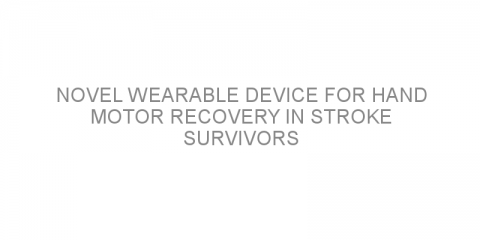In a nutshell This study investigated the benefits and harms of Cerebrolysin in the treatment of stroke. Researchers suggested that Cerebrolysin has a limited effect on preventing death in stroke. Some background Every year, more than 795,000 people in the US have a stroke. A stroke happens when blood flow to the brain is blocked due to a blood clot...
Read MoreStroke Posts on Medivizor
Backward walking training improves walking and balance in stroke survivors
In a nutshell This study investigated the effectiveness of backward walking (BW) training in the treatment of patients with stroke. Researchers suggested that BW improves walking, including speed and balance in stroke survivors. Some background Stroke is a major health problem in the US with more than 795,000 new cases every year. It happens when the...
Read MoreRespiratory muscle training improves lung function in patients with stroke
In a nutshell This study reviewed the effects of respiratory (breathing) muscle training (RMT) in the recovery of stroke survivors. Researchers suggested that RMT improved lung function and reduced the risk of lung complications in these patients. Some background Around 2 million people in China experience a stroke every year. 70 to 80% of the...
Read MoreNovel wearable device for hand motor recovery in stroke survivors
In a nutshell This study investigated whether combining clicks with muscle stimulation could improve hand treatment in stroke survivors. Researchers suggested that this treatment can produce a small but significant treatment improvement. Some background Stroke is a serious condition that more than doubled in low- and middle- income countries in the...
Read MoreIs sleep quality and duration associated with stroke risk?
In a nutshell This study investigated the effect of sleep quality and duration on stroke risk in Chinese patients. Researchers suggested that impaired sleep is associated with a risk of stroke in these patients. Some background Stroke is a severe condition that affects millions of people worldwide. A stroke consists of a decrease in blood flow to the...
Read MoreMedication and psychological therapy decrease depression in stroke survivors
In a nutshell This study reviewed the effects of medication, psychological therapy (PT), and non-invasive brain stimulation in depression after stroke. Researchers suggested that medication and PT reduce depression and improve mood in stroke survivors. Some background A stroke happens when the blood flow to the brain is cut-off. This can be a result...
Read MoreCombined exercise and cognitive training improves the treatment outcomes of stroke survivors
In a nutshell This study investigated the feasibility and adherence of a combined training treatment for stroke survivors. Researchers suggested that this treatment is safe and has significant adherence from patients. Some background A stroke happens when the blood flow to the brain is blocked. Brain cells stop receiving oxygen and begin to die. These...
Read MoreDeep dry needling improves leg stiffness in stroke survivors
In a nutshell This study investigated the effects of deep dry needling (DDN) in patients with stroke and leg spasticity (stiffness). Researchers suggested that DDN decreases leg muscle spasticity in stroke survivors. Some background Each year, 15 million people worldwide suffer a stroke. Stroke is a result of a decrease in blood flow to the...
Read MoreAbobotulinum toxin A improves the treatment outcomes of patients with stroke previously treated with other botulinum toxin drugs
In a nutshell This study investigated the effectiveness and safety of abobotulinumtoxinA (ABTA) in the treatment of patients with stroke who previously received other botulinum toxin products. Researchers suggested that ABTA was associated with improved outcomes for these patients. Some background Around 795,000 people in the US have a stroke, every...
Read MoreRespiratory muscle training improves the outcomes of stroke survivors
In a nutshell This study investigated the effectiveness of respiratory muscle training (RMT) as a treatment for stroke survivors with troubles speaking, breathing or swallowing. Researchers suggested that RMT might be a good supporting therapy to treat these patients. Some background A stroke happens when blood flow to the brain is cut-off. This can...
Read MorePhysical training is associated with reduced mortality and disability in stroke survivors
In a nutshell This study reviewed the impact of physical training (PT) after stroke in death rate, dependence, and disability in stroke survivors. Researchers suggested that PT is associated with fewer deaths and lower disability rates in these patients. Some background A stroke happens when the blood flow is cut off by a blood clot or a burst...
Read MoreFunctional electrical stimulation improves balance in stroke survivors
In a nutshell This study investigated the effects of balance training with functional electrical stimulation (FES) to treat stroke survivors. Researchers suggested that this treatment improves balance and muscle activation in patients with stroke. Some background Every year, more than 795,000 people in the US have a stroke. It happens when the blood...
Read More














